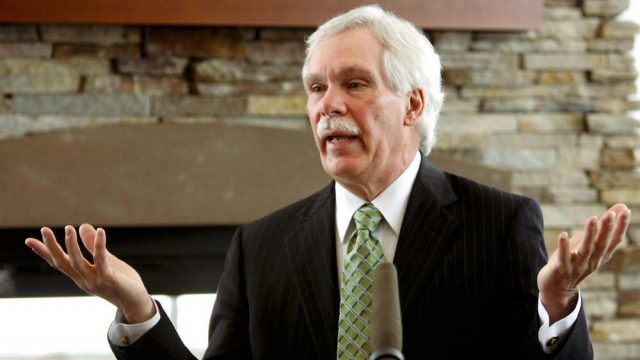Credentialing Bias And The Arrogance Of Academia

Former North Dakota Governor Ed Schafer announces the "Fix the Tax" campaign to lower during a Monday morning press conference in Fargo to lobby for lower oil production taxes. Michael Vosburg / Forum Photo Editor
“I think I just heard a collective puke from the campus.”
That’s what a journalist for one of North Dakota’s newspapers told me when I broke the news yesterday that former Governor Ed Schafer and UND Provost Thomas DiLorenzo were finalists to be interim president at the University of North Dakota (the State Board of Higher Education will be approving one or the other today).
The figurative puking was no doubt a response to the fact that DiLorenzo isn’t very popular with faculty (see here), and Schafer doesn’t have the right academic credentials in the minds of the university system elite.
The opposition to DiLorenzo is understandable. “[W]hile Provost DiLorenzo is an extremely capable administrator, he’s also very much a part of the current administration—and given the high-profile events of the past year on campus that will culminate in President Robert Kelley’s retirement in January, it’s probably time for a change,” the Grand Forks Herald editorial board writes today.
More than probably. Kelley will be leaving a mess behind him. UND needs a clean break from that.
[mks_pullquote align=”right” width=”300″ size=”24″ bg_color=”#ffffff” txt_color=”#000000″]”You can’t run a real University without a Ph.D,” former state lawmaker and erstwhile Democrat gubernatorial candidate Tracy Potter posted on Facebook. “The faculty will feel superior to their boss.”[/mks_pullquote]
But the opposition to Schafer is more curious, and judging by the reactions I’ve seen on social media and in my email inbox, the chief complaint is that Schafer doesn’t have a doctorate degree.
That seems to this observer to be a proxy argument for the fact that Schafer isn’t a higher education insider.
It’s not like the man has no academic credentials. He is a UND graduate, after all, and has an MBA from from the University of Denver. He is also a successful two-term governor, and served for two years in the cabinet of former President George W. Bush as the Secretary of Agriculture.
But the complaints persist. “You can’t run a real University without a Ph.D,” former state lawmaker and erstwhile Democrat gubernatorial candidate Tracy Potter posted on Facebook. “The faculty will feel superior to their boss.”
Those snobby comments say more about the attitudes among faculty, I think, than it does about Schafer’s qualifications. Because what’s the argument they’re making? That Schafer is competent enough to be governor of the whole state of North Dakota, that he’s competent enough to administer complex agricultural policy for the entire nation, but for want of a doctorate degree he’s not competent enough to temporarily be the chief executive of a smallish public university?
This attitude – and I think it’s both real and prevalent on our nation’s campuses – is indicative of how closed minded and insular the higher education industry has become.
The only problem with Schafer’s appointment – which seems a foregone conclusion at this point – is that it won’t be longer. He would take office in January, and a new president would likely be selected in July of next year according to the current timeline.
If anything the State Board of Higher Education should consider stretching Schafer’s term of service.




